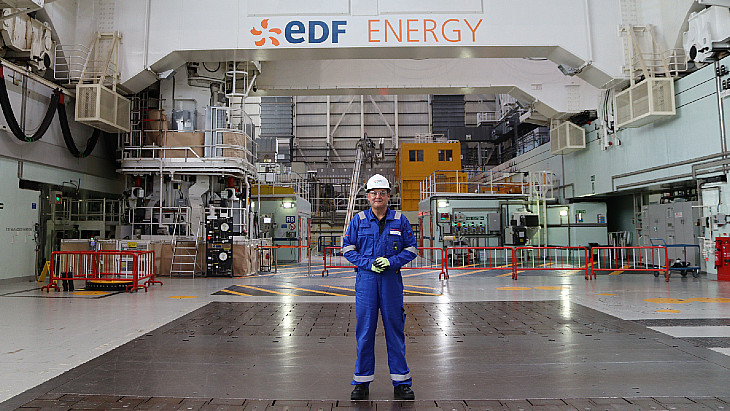Viewpoint: Ontario's nuclear advantage
-2018.jpg)
"Not only that, but tomorrow's advanced nuclear technology, built right here in Ontario, will play a key role in addressing climate change - our generation's greatest challenge.
Thanks to the refurbishment and continued operation of our nuclear fleet - Pickering, Darlington, and Bruce - Ontario will continue to benefit from a clean and stable supply of electricity both today and well into the future.
And we are well-positioned for the inevitable transition towards a low-carbon economy. This is where - to quote from the CNA's recent public awareness campaign - 'the nuclear advantage' comes into play.
Nuclear is the backbone of Ontario's energy system. That's because it currently supplies more than 60% of the power Ontarians use each and every day. And because of nuclear energy's undisputed role as a reliable source of baseload power. Nuclear energy is also a competitively priced source of power. In Ontario, for example, the average cost of nuclear energy is about seven cents per kilowatt-hour of electricity, making nuclear energy one of the cheapest sources of power for our province. Equally important, nuclear energy is free of greenhouse gas emissions.
The use of nuclear energy is allowing Ontario to move closer to meeting its greenhouse gas emission reduction targets in its Action Plan against climate change. Emissions-free nuclear energy played an important role in the ecological shift in the electricity grid. This same network will meet the demand for more electric vehicles on Ontario's roads. An electrical network that is now 96% without emissions. But that's not all. Thanks in large part to nuclear energy and its obvious ability to provide Ontarians with reliable base energy, at any given time, Ontario was able to eliminate coal-fired electricity generation in 2014.
At that time, Al Gore hailed this precedent-setting achievement as the "largest greenhouse gas reduction initiative in North America". And with the elimination of dirty coal-fired generation in Ontario, coupled with forward-thinking investments in clean energy generation, Ontario’s air quality dramatically improved. The figures speak for themselves.
In 2005, Ontario had 53 smog days. On those days kids who live with severe asthma couldn’t play outside because of the serious risks posed by poor air quality. Now fast forward to last year, Ontario reported zero smog advisories. This significant improvement in our air quality should be a point of pride for Ontarians. It has improved our quality of life. And it has reduced a serious strain on our healthcare system. Both air pollution hospitalisations and air pollution deaths are way down. Ending coal generation has not only been a big environmental success, but an enormous public health success.
But the benefits of nuclear energy have a significant economic impact as well. For example, Ontario’s globally-recognized nuclear supply chain supports over 200 companies and some 60,000 jobs. These highly skilled, good-paying jobs, in turn, help grow the economy at both the local and regional level over the long term. The refurbishment of the Bruce and Darlington Nuclear Generation Stations provide good examples of this.
According to an economic impact study conducted by a consortium of our energy sector partners, Bruce Power will create and sustain 22,000 direct and indirect jobs annually, while contributing $4 billion to Ontario’s economy. This also provides a huge boost to the local economy with suppliers establishing a local presence and building up the community in the Bruce-Grey-Huron region.
Darlington's refurbishment - once complete - and in operation over the next 30 years will boost Ontario's GDP by approximately CAD90 billion dollars. Added to this, Darlington's refurbishment will generate an average of 14,200 jobs annually. This includes 2600 onsite jobs at Darlington.
Now, earlier this month, my team was able to celebrate with OPG an important milestone at Darlington. Unit 2's refurbishment is 50% complete. And is on time and on budget. Darlington's success to date is a testament of the good work done by OPG, the Ontario government, and the nuclear energy sector in keeping this project on track. This collaborative work involved advanced preparation, the sharing of knowledge amongst various parties and multiple levels of oversight. In addition to the strong support provided by an assortment of host communities.
As the minister of energy, I would say that the refurbishment of the four reactors at the Darlington Nuclear Generating Station, as well as the six reactors at the Bruce Kincardine Nuclear Generating Station, will not only provide 9800 low-cost, reliable and emission-free megawatts, but with the deferral of the Pickering plant closure in 2024, reaffirm that nuclear energy is undeniably a central pillar of Ontario's energy future.
Our commitment to nuclear energy, and particularly to these refurbishments, is also emphasised in our long-term Energy Plan, entitled Ensuring Fairness and Choice. More specifically, this plan highlights the important role that the nuclear sector has played - and will continue to play - in innovation in energy and non-energy applications.
Ontario, with its knowledge of the nuclear field, is a pioneer in nuclear research and medicine. Think of the production of isotopes, which help save the lives of millions of people around the world. And that's not all.
Ontario is also creating new export opportunities for nuclear innovations in a wide variety of fields that include small modular reactor technology, nuclear fuel research and hydrogen. I should add: this re-affirmation of nuclear energy extends beyond our Long-Term Energy Plan.
Last November, in a report issued by the Financial Accountability of Ontario, our province’s independent financial watchdog stated: "There is no alternative clean, emissions-free generation that could effectively replace nuclear generation at a comparable cost for Ontario's ratepayers." As our government prioritises clean, reliable and affordable electricity, this is a strong endorsement. And proves, once again, the critical role our nuclear sector plays.
So, I would like to thank the CNA for its work on the 'Ontario Nuclear Advantage' campaign helping to spread awareness of the value of nuclear. In this room, we all know the advantage of nuclear power. And, as Ontario's experience shows, the strong support of host communities is essential. We all must do our part to continue to promote the benefits of nuclear power as a solution to future energy and environmental priorities.
Priority number one is to continue our success with refurbishments, demonstrating that with proper preparation, oversight, and cooperation that we can successfully execute on these large infrastructure projects, protecting ratepayers and creating benefits for future generations in in Ontario.
This will continue to be a top priority for me as minister, and I know that virtually everyone here has a part to play. I look forward to continuing to work with you all to ensure that a decade from now, we can return to this forum to announce that all of Ontario’s nuclear refurbishments were completed on time and on budget, for the benefit of future ratepayers and all Ontarians."
Researched and written
by World Nuclear News










